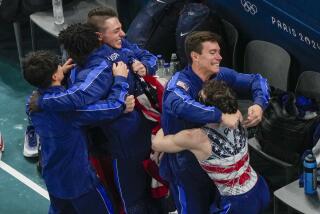Pond Offers an Earful of Gymnastics
- Share via
Can’t tell a Yurchenko from a Podkopayeva? A 2 1/2 punch front from a Tkatchev?
John Roethlisberger, Peter Vidmar, John Macready, Shannon Miller and other former gymnasts will identify each of those moves and whisper the explanation in your ear on an in-house radio station set up at the Arrowhead Pond for the World Gymnastics Championships.
KGYM (87.8 FM) went on the air Saturday for the men’s team preliminaries and provided play-by-play and analysis of the competition. Roethlisberger, Vidmar and Macready offered insights from their competitive days and mixed in humor, all without missing the action on the floor.
“We want to make it fun,” said Vidmar, an honorary co-chair of the competition.
They also made it informative. When Romania took the lead over Japan after three rotations Saturday, Macready cautioned that Romania hadn’t yet competed on two of its weakest events, high bar and parallel bars -- and sure enough, the Romanians had meltdowns there. They also discussed Japan’s use of a sugar-water mixture on the parallel bars to get a better grip on the apparatus and had fun pointing out that Japan’s Naoya Tsukahara didn’t do a Tsukahara vault, which was named for his father, and Akihiro Kasamatsu didn’t do a Kasamatsu vault, named for his father.
“This is big news in Japan. The Japanese tabloids will be all over this,” Roethlisberger said, laughing.
Fans can bring their own radios or can purchase a radio in the arena for $10. Only radios with headsets or earplugs will be permitted. Signs and announcements in the arena will instruct listeners which frequency to tune to. However, the signal won’t carry far outside the building.
Although it’s not a novel idea -- a similar arrangement was in place at the 1991 world championships in Indianapolis -- the broadcasters believe that it will enhance the experience for spectators at the Pond.
“Anybody who has been to a gymnastics meet has probably been impressed with the gymnastics and the show itself, but one of the downfalls is not knowing what score a gymnast needs [to win] or who’s up on what event,” said Roethlisberger, a three-time U.S. Olympian.
“When you go to a basketball or hockey game, the score is obvious. It’s up on the scoreboard. In gymnastics, it’s not real obvious. We’re going to say something like, ‘The U.S. is going to the high bar and needs x number of points to win.’ But we’re also going to try to bring out the excitement of the event.”
This isn’t a new experience for Vidmar. He has done gymnastics play-by-play for Westwood One radio and recalled doing a live, four-hour broadcast from the 2000 Sydney Games.
“It was interesting trying to describe what’s going on to a listener who might be sitting in a car in Des Moines,” Vidmar said. “What’s good about this is everybody listening will be there, in the arena.
“You can draw attention to a performance or an athlete. You can say, ‘Let’s watch parallel bars because this guy is a former world champion,’ and I think people will appreciate that. Much of this competition is going to be a six-ring circus, and we can help point out things people might otherwise miss.”
More to Read
Go beyond the scoreboard
Get the latest on L.A.'s teams in the daily Sports Report newsletter.
You may occasionally receive promotional content from the Los Angeles Times.







